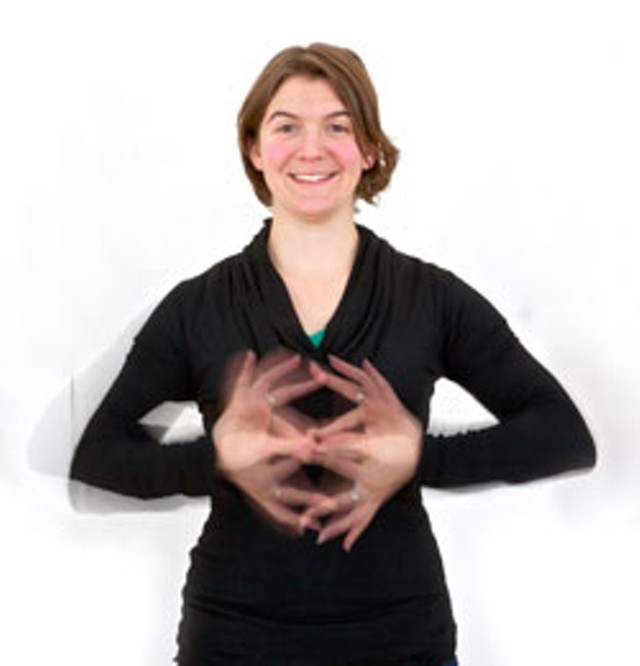Published February 13, 2013 at 10:43 a.m.
When learning a new language in school, students are usually graded on pronunciation, spelling, translation and grammar. When Elizabeth Bjerke, 34, worked her way through the National Technical Institute for the Deaf, a college of the Rochester Institute of Technology, to become an American Sign Language-English interpreter, she was graded not just on the movement of her hands but on how she used her entire body, even her eyebrows.
Today, Bjerke works as an independent contractor for ASL-English interpretation in the Brattleboro area — primarily in professional settings, though she has been hired as an interpreter for almost every occasion you can imagine. “From birth to death, and most everything in between,” Bjerke says.
While she isn’t trained to interpret in a legal setting, for more than 13 years, Bjerke has served that function at doctors’ visits, therapy appointments, business meetings and even theatrical performances such as The Vagina Monologues and Willy Wonka & the Chocolate Factory.
Interpreting during a play differs from her usual work, because she’s communicating in one just direction — to the audience — but it’s definitely fun, Bjerke says.
“I remember there was one part in the beginning of [The Vagina Monologues] that was hysterical, because the [actress] was talking about her vagina, like, ‘What’s the big deal, it’s just a vagina,’” she recalls.
Bjerke emphasizes that conveying a person’s message is about much more than moving your hands in a way that symbolizes specific words. ASL and English are vastly different languages, each with its own syntax, grammar, structure and other linguistic features. She describes her job as listening to English, analyzing its meaning, processing how best to render that meaning in sign and producing the message as accurately as possible. And fast.
Seven Days had a few words with Bjerke, all in English.
SEVEN DAYS: What was your introduction to this field of work?
ELIZABETH BJERKE: I was working in the local kindergarten in the before-school program during my junior year of high school. We had a boy who used ASL in our class, and I thought, Dang! That’s awesome. I wonder how I can communicate with him. Then I spotted an interpreter in the classroom. I watched her working and knew that this was up my alley. I err on the side of visual expressiveness (ask my folks), so to discover that there is a visual language was great. On top of that, to find out that there is a profession that specifically works between visual and spoken languages was like candy for my mind.
SD: What are some of the biggest misconceptions about your work and ASL as a language?
EB: People think we are there just for deaf people (we are there on behalf of both entities who want to communicate with each other), or that we simply stand somewhere in a bubble and move our hands. I’ve actually had people come up to me and say, “Oh, you’re the person in the bubble on TV,” which they’ve seen during live televised events.
With ASL, folks don’t realize that the grammar of the message is conveyed through your face, as well as with the pace of the signing. They can misconstrue linguistic features for intense emotions. What you do with your eyebrows, for example, is going to let someone know if there’s a question or a comment, and even what kind of question: a yes/no question or a rhetorical question.
SD: What are some of the most challenging scenarios for you to interpret?
EB: Sometimes working with little kids can be difficult for me because their little hands are flying so fast. Kids being kids, they love to talk about everything!
Using your discretion when accepting an assignment is very important. I need to abide by a code of professional conduct. An interpreter needs to make sure they’re in a situation that is appropriate for their skill level. I don’t just take any old assignment; I want to make sure I’m a good match for both language needs and the people involved, and that I can handle the material without bias. For a long time, for example, I didn’t do any medical interpreting because I knew I would pass out! I had a hard time with blood and needles.
SD: What is it like to interpret during a birth?
EB: I have to be mindful of my presence there and be sure that it’s not disruptive or intrusive. I want to make sure everybody can still do what they need to do. In a crowded hospital room the doctors have their goal; the parents have theirs. They might be overwhelmed. And I need to be in the right location so everyone can see or hear me. Navigating between all these competing needs can be tough. Anytime I’m in a situation that is emotionally charged, it doesn’t mean I should be emotionally charged. I try my best to be a neutral entity.
SD: Have you ever found yourself getting emotionally involved?
EB: Ideally, I should keep everything together and always be neutral, but I’m human. There are times, like at a wedding, when it’s very sweet and I’ve totally shed a tear, or been at a funeral where it’s very personal. It can really touch you.
SD: Do you ever make mistakes?
EB: Of course, and the way I handle it is to own up to it. I’ll say, “Oops, that was a misinterpretation,” and then correct it. There have been times when I’ve totally laughed out loud. When something’s funny, something’s funny! I’ve also had moments when my hands just don’t coordinate with the rest of my body. I’ve even poked myself in the eye before and had rings fly off my fingers.
More By This Author
Speaking of...
-

Vermont to Open $20 Million Business Flood Relief Fund
Jul 27, 2023 -

Video: Following Seven Days' Paper Trail to Québec
Jun 21, 2023 -

Rochester Grocery Store to Close, Leaving Residents in the Lurch
Apr 24, 2023 -

Video: Saying Goodbye to Burlington’s Penny Cluse Café
Nov 17, 2022 -

Essay: Natalie Miller Riffs on How Her Nightclub Survived the Pandemic
Sep 14, 2022 - More »
Comments
Comments are closed.
From 2014-2020, Seven Days allowed readers to comment on all stories posted on our website. While we've appreciated the suggestions and insights, right now Seven Days is prioritizing our core mission — producing high-quality, responsible local journalism — over moderating online debates between readers.
To criticize, correct or praise our reporting, please send us a letter to the editor or send us a tip. We’ll check it out and report the results.
Online comments may return when we have better tech tools for managing them. Thanks for reading.













































